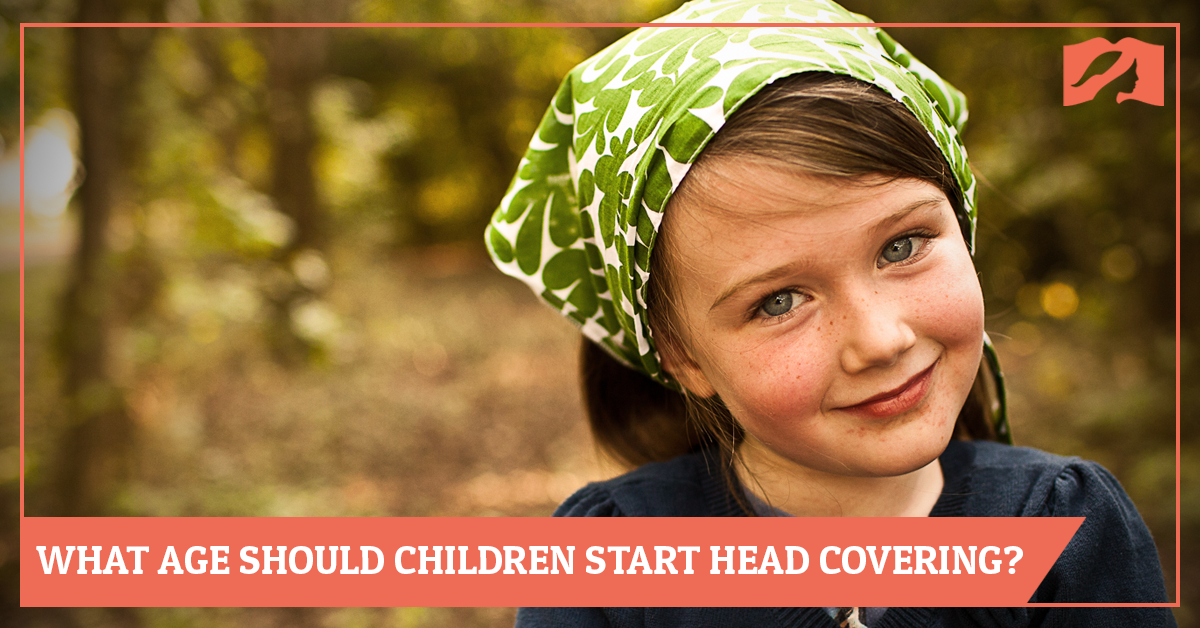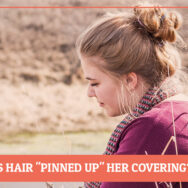What Age Should Children Start Head Covering?

As the parents of five daughters (from 9 months through 12 years), my husband and I have had to consider whether or not we want them to wear a head covering to church — and if so, at what age they should start. I think this question is very common in families where the mother has started to cover. In this article I’d like to consider this question of age from three angles:
- What does the Bible say?
- What does this look like practically?
- What have we done as a family?
What Does The Bible Say?
When considering any sort of life change, it’s always important to observe what God Himself has said about the subject. So, does the Bible offer any guidance that would help us decide at what age females should start head covering? I believe that it does.
1 Corinthians 11:4-5 says:
“Every man praying or prophesying, having his head covered, dishonoureth his head. But every woman that prayeth or prophesieth with her head uncovered dishonoureth her head: for that is even all one as if she were shaven.”
So, every woman must pray or prophesy with her head covered, or else dishonor her head. But, since the New Testament was originally written in Greek, what does the word woman specifically mean in the original language? Could it mean all females, both children and adults?
An excellent Greek lexicon often utilized in New Testament scholarship is “A Greek-English Lexicon of the New Testament and Other Early Christian Literature”¹ (often referred to as “BDAG”). It notes these three meanings of the word “woman” (or gune in Greek):
- an adult female person, woman
- a married woman
- a newly married woman
So, gune refers to either married or unmarried women, but it apparently does not include female children. In 1 Corinthians 11, this same word is used in verses 3, 5 (quoted above), 6, 7, 8, 9, 10, 11, 12, 13, and 15. In other words, gune is used throughout the whole passage to indicate an adult woman.
According to Bible Study Tools (an online Bible study aid), this same word is used 221 times in the New Testament. In 129 occurrences it refers to “women,” and 92 times it refers to a “wife.” Never is it used in the Bible to describe female children.
Rather than gune, Scripture uses the Greek terms thugatrion (translated as “little daughter”) and korasion (“girl” or “little girl”) when referring to female children. For example, Mark 5:42 uses korasion to describe a 12-year-old girl that Jesus raised from the dead. Along similar lines, Matthew 14:21 lists “women” separately from “children,” indicating that the Greek word for “women” refers to adults.
What Does This Mean For Us Practically?
In consideration of the specific Greek term for “women” that Paul uses in 1 Corinthians 11, his commands about head covering must apply specifically to adult women and are not biblically necessary for children to observe. Some parents don’t require their daughters to cover but instead allow them to choose for themselves whether or not they will practice it when they become adults. In doing so, these parents are functioning fully within biblical parameters.
However, guiding girls to wear a head covering in church may still be useful practically as a teaching tool for their daughters’ benefit. How so? Primarily because it can help train them to obey God in this way when they grow up: “Train up a child in the way he should go, and when he is old he will not depart from it” (Proverbs 22:6). Perhaps these daughters will later appreciate that their parents helped prepare them for successful adulthood, thereby making the transition easier. It might even be helpful, if the parents wish, to have girls start covering at a very early age, since this might encourage them to feel comfortable wearing one, thereby reducing some of the awkwardness of transitioning into head covering later on.
One way of looking at this follows along these lines: We require our children to eat their broccoli, brush their teeth, go to bed at a sensible hour, do their homework, participate in family devotions, go to church, etc. without feeling that it is beyond the sphere of our authority to do so. What makes wearing a head covering any different? In other words, even if children do not fully appreciate the reason for their training, parents still have the God-given responsibility of raising their children in the way they should go. Expecting our daughters to do something that we consider a benefit to their growth is perfectly reasonable.
Additionally, we probably ask our boys to take their cowboy hats and baseball caps off before entering church. How is it consistent to require this of them but not require head covering from our daughters?
A case can be made both for not requiring female children to wear a head covering, and also a case for requiring them to. In the end, then, it is really up to the parents to decide what they believe is most appropriate for their own family, praying about it as they consider the Scriptures and seek wise counsel.
At this point, I believe it’s important to add that if we want our children to follow in our footsteps, it helps to have a good relationship with them. When our children feel loved, accepted, appreciated, and listened to, they will be more likely to have a close bond with us and respect our viewpoints. But, when there is bitterness and resentment (cf. Eph. 6:4, Col. 3:21), it will be harder for them to accept our way of living. Instead, they might see us as hypocrites.
Our Own Family’s Practice
My husband and I have come to an “in-between” conclusion. We have decided that we will have our daughters start covering in church at the age of 16. By this time, our daughters will be mature enough to understand the reasons the Bible gives for covering and will hopefully be strong enough to resist the peer pressure to conform to what everybody else is doing.
At this phase of their lives it will be important for them to have their own relationship with the Lord and begin living out their faith as individuals. At the same time, they will still be immature in many ways and will still need their parents’ guidance and support. Having them wear a head covering at this stage may be a way we help them develop the bravery to do uncommon things. In other words, we’re their support team as they develop their character in the real world. Being a little “different” at church might just help strengthen their spiritual muscles, which could help them stand firm in other important areas as well.
If any of our daughters have the desire to cover before that time, they’re perfectly welcome to! We won’t restrict them at all. Perhaps, it’s not wise to influence our children to feel that it is somehow “too early” to obey God if His Spirit is convicting them of something. We want them to respond willingly to His nudging on their hearts. And so this is something we not only welcome, but encourage.
Summary
When it comes to deciding if we should have our daughters start head covering, the Bible gives some helpful guidance in the 1 Cor. 11:2-16 passage through its use of the word gune, which means an adult woman (not a child). From this we can conclude that God does not expect young girls to cover. However, parents are at liberty to have their daughters cover at whatever age they feel appropriate, if that is what they believe is best for training their children up in the way they should go.
***
What does your family do? Why did you (or your parents, if you’re a minor) decide to do things that way? Please tell us about it in the Comments section below. We look forward to hearing from you!
¹ Bauer, Walter. A Greek–English Lexicon of the New Testament and Other Early Christian Literature. Edited by Frederick Willam Danker, 3rd Ed., University of Chicago Press, 2000.
- Our Response to “Uncovering The Head Covering Movement” Part 2: From the Heart of a Head Covering Woman - October 25, 2024
- Covering Testimony: Mary Beth Voelker - May 28, 2024
- Covering Testimony: Allura Lightfoot - October 20, 2023



